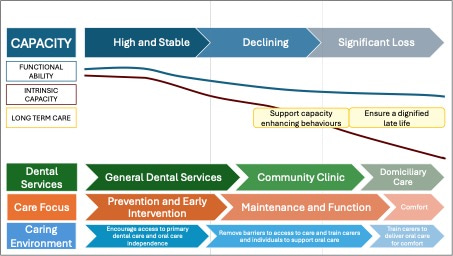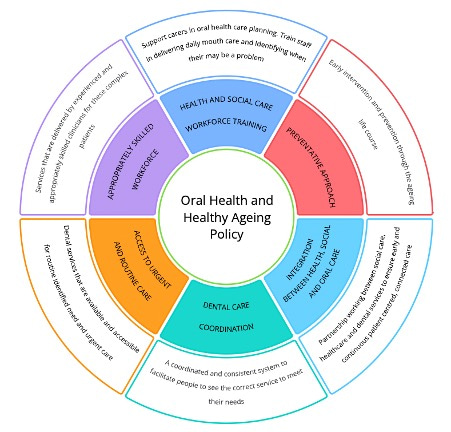World Health Day 2025: 'Getting long in the tooth' and why oral health matters
Published in General & Internal Medicine

Explore the Research

Healthy ageing and oral health: priority, policy and public health - BDJ Open
BDJ Open - Healthy ageing and oral health: priority, policy and public health
The 'Healthy ageing and oral health: priority, policy and public health' paper is the product of my clinical and research experience and understanding of policy and public health. I began undertaking dentistry in peoples homes / care homes (domiciliary care) early in my career. This exposed me to the high levels of dental disease and limited treatment options that were often presented when residents were non-compliant and reliant on carers for personal care. I began to explore what policy, guidance and support there was for carers and patients and how we could prevent dental diseases as interventional dental treatment was complex once a dental problem arose. At the time, there was little, but since then fortunately, this has been an evolving space. The National Institute for Clinical Excellent (NICE) released guidance on how to support the oral health of those in care homes (NG48) in 2014, followed by the Care Quality Commission (CQC) exploring the uptake of the guidance and broader challenges to the dental access in care homes in their 2019 and 2023 'Smiling Matters' reports.
With people living in their own homes for longer and entering care with more complex medical, behavioural and physical challenges, rather than focus on care home settings, I wanted to understand the life course of ageing more broadly.
In 2019 I was fortunate to undertake the World Health Organisation 'Healthy Ageing' Programme and this is where the framework for the paper came from. In that course we explored definitions of and approaches to ageing, the prevalence of ageism and health service planning in differing global systems. This set the context for this paper whereby I took the WHO public health framework for healthy ageing and reimagined it in a UK dental context.

Taking a broader lens with a focus on primary prevention of chronic diseases including oral diseases and a common risk factor approach was at the core of this paper with the aim of shaping a system for long term change. This was displayed in the image proposing an integrated model of oral health and ageing, where by action on six areas was presented: early prevention of dental diseases, integration of oral health with health and social care, oral health related training for the health and social care workforce, a dental workforce skilled in gerodontology, dental care co-ordination, and access to urgent and routine dental care.

Action to improve the oral health of our ageing population is complex but needs urgent consideration. From a patient perspective, the impact that the oral condition has on an individual’s quality of life and function is of vital importance, made further relevant by the bidirectional relationship with general health. As a health system, it is imperative that measures to plan for services which are patient-centred, and prevention focused are put in place.
The intent of this paper was to raise awareness, advocate for a whole system approach and suggest actions for change. Further to this paper, we are looking to how we can influence the development of policy and training in the space and drive integration of oral health into health and social care at local, regional and national levels.
References:
- Care Quality Commission. Smiling Matters: Oral health in care homes. (2019). Smiling matters: oral health care in care homes - Care Quality Commission (cqc.org.uk)
- Centre for Ageing Better. The state of Ageing 2022 online report published March 2022. https://ageing-better.org.uk/health-state-ageing-2022
- Decade of healthy ageing: baseline report. Geneva: World Health Organization; (2020). Licence: CC BY-NC-SA 3.0 IGO. 9789240017900-eng (2).pdf
- Department of Health (2009). Delivering Better Oral Health: An evidence-based toolkit for prevention. Delivering better oral health: an evidence-based toolkit for prevention - GOV.UK (www.gov.uk)
- Global report on ageism. Geneva: World Health Organization; (2021). Licence: CC BY-NC-SA 3.0 IGO. https://www.who.int/publications/i/item/9789240016866
- National Institute for Health and Care Excellence. Oral Health for adults in Care Homes. NICE Guideline NG48. Published 2016. Overview | Oral health for adults in care homes | Guidance | NICE
- Patel, R., Mian, M., Robertson, C., Pitts, N. B., & Gallagher, J. E. (2021). Crisis in care homes: the dentists don't come. BDJ Open, 7(1), 20. Https://doi.org/10.1038/s41405-021-00075-4
- Public Health England, (2015b). What is Known About the Oral Health of Older People in England and Wales A review of oral health surveys of older people. Oral health of older people in England and Wales - GOV.UK (www.gov.uk)
- Sheiham A, Watt RG. The common risk factor approach: a rational basis for promoting oral health. Community Dent Oral Epidemiol. 2000 Dec;28(6):399-406. doi: 10.1034/j.1600-0528.2000.028006399.x. PMID: 11106011.
- World Health Organisation (January 2024) Draft Global Oral Health Action Plan (2023–2030). Available at: https://www.who.int/publications/m/item/draft-global-oral-health-action-plan-%282023-2030%
Follow the Topic
-
BDJ Open

This is an international, peer-reviewed, open-access, online-only journal publishing dental and oral health research from all disciplines. The journal is owned by the British Dental Association (BDA) and is the sister journal of the British Dental Journal.




Please sign in or register for FREE
If you are a registered user on Research Communities by Springer Nature, please sign in